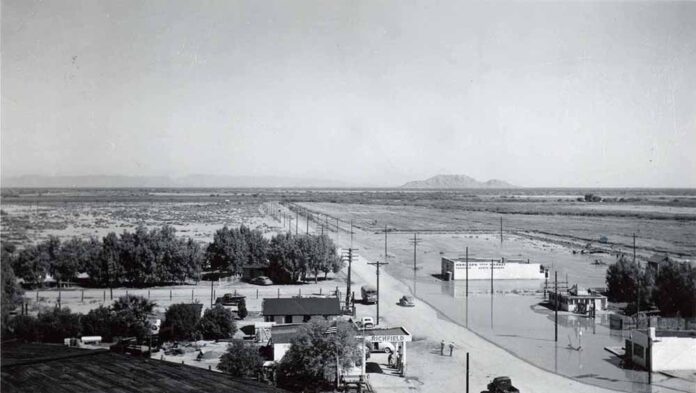
By Patricia Brock and the Maricopa Historical Society
Bertha Anderson Easley and her husband Jay Easley came to Maricopa in 1947.
“We lived on Porter Ranch, and Jay worked for the Porter family,” Bertha said. Several members of her husband’s family were already living in Maricopa and working for E.K. Porter, who lived east of Maricopa on Porter Road. Family members included Jay’s brother Leland (wife Ruth) Easley, Richard Easley and Rufus (wife Rene Easley) Cooper working in the area.
Bertha was born in 1922 in Seamore, Texas, where she spent her childhood living in tents and following the oilrigs. Her father, Dee Anderson, worked as a driller for an oil company. However, this did not prepare her for life in a small farming community in the middle of the Arizona desert.
“We moved to Maricopa after the war when my husband came home from the service,” she said. “My first impression of Maricopa was I thought it was a hellhole. All the roads were fine dirt and gravel. The businesses in Maricopa consisted of a couple of bars, one store, a post office located in the train depot, one gas station located on one street (Maricopa Highway) and a small school.”
During cotton-picking season, the Easleys went to Oklahoma and hauled people into Maricopa to pick the cotton.
Living in a cabin and a boxcar, Bertha ran lunch wagons for cotton pickers. She served stew or beans, making trips once a week to Phoenix to get groceries. They also served dinners at night for the pickers.
“We ate meat, potatoes and vegetables, and for dessert we had cake or cookies,” she said. “We had no refrigerator, just an icebox. Nor did we have indoor toilets or showers … just outside toilets and bathtubs. I picked some cotton, but not much. I helped cook and served. We paid in cash to the pickers.
“While in Maricopa, we had flash floods that washed our roads out. We couldn’t get out unless we walked through water…which we did. Sometimes, Mr. Porter would take us through the water on a tractor to get our groceries at Casa Grande, or we would walk to Maricopa along the railroad tracks. We would take the kids’ wagon to bring back ice and whatever else we needed until the water went down.”
Ruth Easley, who was married to Jay’s brother Leland, said, “My family and my husband’s family were part of the ‘Dust Bowl’ migration to California in the 1930s. I met George Leland Easley in Modesto, California, and married him June 29, 1947.
Ruth and Leland moved to Maricopa in 1949 to work on the Porter cotton ranch, which was located just east of town on the way to Casa Grande.
“On weekends, the camp could get pretty rowdy,” Ruth said. “There would be gambling, drinking and fighting. My niece, Bobbie Honeycutt Stewart, reminded me of an incident where my husband suffered an injury to his hand, when he attempted to break up a fight and was cut by a knife. Just one more Saturday night on the farm.”
They later moved to a small ranch owned by Bruce Wing and Jack Wright, where Leland worked as a farmhand and ran a harvesting crew. After the birth of their second child, they moved into Maricopa and ran the Wander Bar, built by Jack Burkett, a Maricopa pioneer. That property, just north of present-day Napa Auto, later became La Roca, which has since been demolished.
“I remember there was a post office, two grocery stores; hotel and restaurant combined in Maricopa,” Ruth Easley said. “There were two bars, one service station, some Southern Pacific railroad houses along the railroad tracks. Possibly some others I’ve forgotten.”

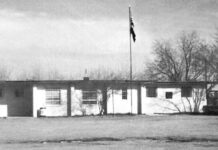
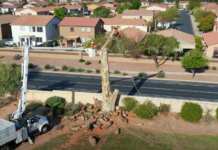
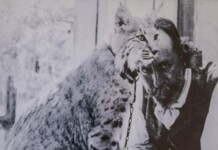
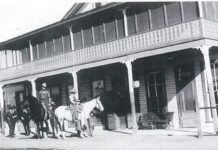
![HISTORY: Politics and prejudice First Lady Elanor Roosevelt visits the Gila River Camps. [Maricopa Historical Society]](https://www.inmaricopa.com/wp-content/uploads/2023/12/Eleanor_Roosevelt_at_Japanese_Interment_Center-1-218x150.gif)
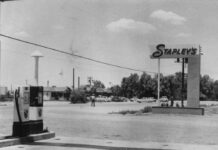
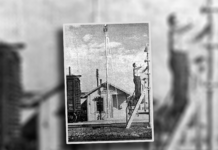

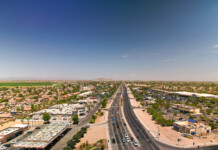






![Shred-A-Thon to take place tomorrow An image of shredded paper. [Pixabay]](https://www.inmaricopa.com/wp-content/uploads/2024/03/shredded-paper-168650_1280-100x70.jpg)
